|
The present day, in the run-up to Christmas. Julie Hart (Tilda Swinton), a filmmaker, arrives at a remote hotel in Wales with her mother Rosalind (also Tilda Swinton) and her dog Louis, partly for Rosalind’s birthday, partly for Julie to work on a new film, the genesis of which is proving difficulty. The hotel has significant memories for both of them. However, strange things begin to happen.
It’s not easy to discuss The Eternal Daughter without spoilers, but I will avoid them as much as possible. Joanna Hogg’s sixth feature film as director comes on as a ghost story, which it is, though the genre trappings enclose a study of a mother and daughter. While certain scenes are unsettling in their atmosphere, and there are nods to classic past ghost stories, this is a film not squarely in the horror genre, and anyone expecting jump scares will come away empty. There are plenty of nods to Hogg’s past work, too. Her first two features – Unrelated (2007) and Archipelago (2010) – took her characters on holiday, to Tuscany and the Isles of Scilly respectively, and studied them removed from their roots in their everyday lives. We have the same here, though in winter rather than in summer and on a much smaller scale. But even with the films where the characters aren’t on holiday (in the Souvenir films, Julie by being a student could also be said to be away from home) much of the film is defined by the rooms the characters occupy. Until the very end we see no other people staying in the hotel, and just two of the staff, the receptionist (Carly-Sophia Davies, who also lends her voice to the film’s music score) and the caretaker Bill (Joseph Mydell). There are just two other credited speaking roles, both small single-scene ones. The remaining member of the credited cast is Louis the dog, played by Swinton’s own springer spaniel following on from some of his relatives who appeared in the Souvenir films.
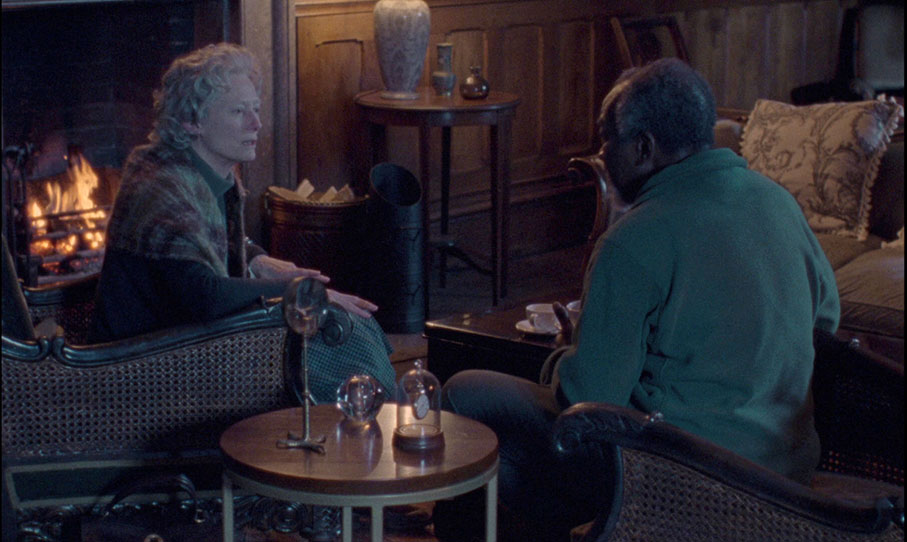
An even closer link is to the two Souvenirs (2019 and 2021). As with those and Exhibition (2013) especially, Hogg’s protagonists are engaged in artistic creation. At the end of the film, Julie is seen writing what appears to be the opening scene of the film we have spent the last hour and a half watching, much as The Souvenir Part II is in part a film about making the film which is its own predecessor. The mother and daughter have the same character names as they do in the Souvenirs, with Swinton then playing Rosalind and the much younger Julie, also a filmmaker, played by Swinton’s daughter Honor Swinton Byrne. However, it would be easy to make too much of this, as this isn’t really a sequel to The Souvenir and The Souvenir Part II. In fact a very early version of this film (without those character names) was written in 2008 as an intended follow-up to Unrelated. Similarly, as Hogg points out in the commentary and interviews on this disc, some references and homages are more happenstance: Julie and Rosalind’s room may be called Rosebud, but that’s not as much a nod to Citizen Kane as it was the actual name of the room in the shooting location. Likewise, a Pazuzu-like shot of a rooftop statue, while certainly adding to the disquieting atmosphere (and featuring in the trailer) is likely not too much of a hat-tip to The Exorcist.
Swinton, in both roles, dominates the film. Hogg almost always frames them in separate shots. We don’t have over-shoulder shots or doubles playing one of the two in shots where both appear, as in, say, Dead Ringers or The Social Network (Hogg specifically mentions the former). In fact, there are only three shots in which both Swintons are onscreen at the same time, two of them in the same scene. For most of the running time, each character is isolated while in close proximity to the other, and the final reveal – which you’ll have to see for yourself – brings this to the forefront all the more sharply. (In a few close-ups of their holding hands, one of the hands is actually Hogg’s. When Julie’s shadow crosses Rosalind, or vice versa, that’s Hogg as well.)
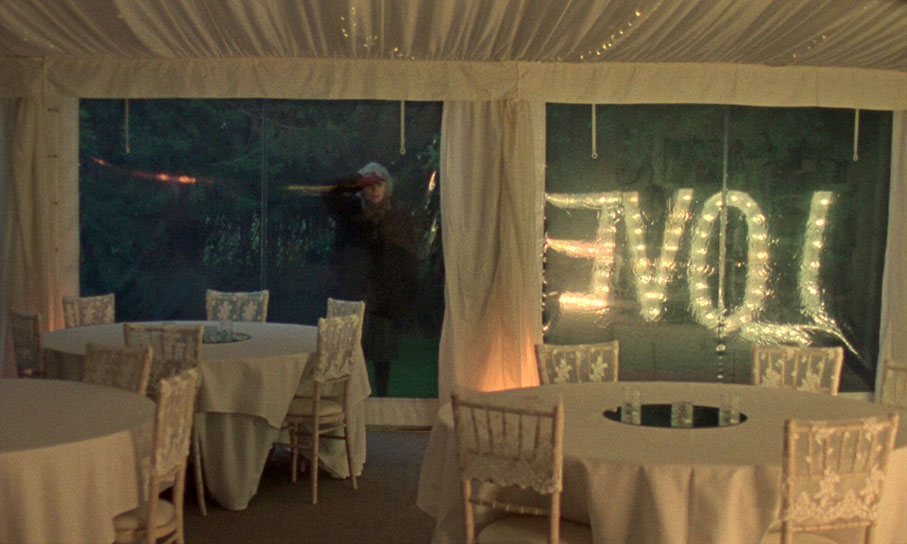
In the past, Joanna Hogg’s films have been marked by a cool, almost cerebral tone, and I confess to have found Exhibition in particular hard work. The Souvenir films seem to have taken her to a broader audience, and The Eternal Daughter, with its genre trappings, may well continue this process. As a study of a mother/daughter relationship, as a study of grief and loss, and as a ghost story, it hits home.
The Eternal Daughter is a Blu-ray release from the BFI, on a disc encoded for Region B only. The film has a 12 certificate and the short Présages a U.
Shot on Super 16mm, The Eternal Daughter is transferred to Blu-ray in the ratio of 1.66:1. Other than the camera negative, the film has been in the digital realm from there to the light of a projector lap, or the pixels of this disc – I’m not aware of any 35mm film prints having been shown. Grain is present, as you would expect, but it is natural and filmlike. Blacks are solid, including in some rather darkly-lit scenes.
The soundtrack comes in two varieties, DTS-HD MA 5.1 and LPCM 2.0, the latter playing in surround, both downmixes from the Dolby Atmos the film had in cinemas. The same sound options are available for the audio-descriptive tracks and for the soundtrack of the trailer. It doesn’t have the most showy of sound designs, with the surrounds being used for ambience (including those howling winds and rattling windows) and the music, both diegetic and non. English subtitles for the hard of hearing are available for the feature and the short.
Commentary with Joanna Hogg and Stéphane Collonge
Joanna Hogg begins by saying that she is glad to have Stéphane Collonge on board for this commentary, as she dislikes talking to herself and he might well remind her of things she has forgotten. Given that this is a chat between a director and a production designer, much attention is paid to the look of the film, with shout-outs to amongst others cinematographer Ed Rutherford and hair/makeup supervisor Siobhán Harper-Ryan for their contributions to it. At first, the plan was to make The Eternal Daughter in black and white, along the lines of classic ghost stories of the past, The Innocents, in particular, and because her first sight of the building (originally a private house, later a hotel, now a wedding venue) where the film was eventually shot was a black and white one from the 1970s. But given that the film was made in colour, attention was made to the hues on display, from the sickly greens of the hotel walls, to the lighting which is almost autumnal in places. Hogg also talks about the input of Martin Scorsese, who acted as executive producer (as he did on the Souvenir films) and who pointed her towards past ghost stories, both written and cinematic. For example, Rudyard Kipling’s short story “They” was his suggestion, and we see Julie reading it at one point.
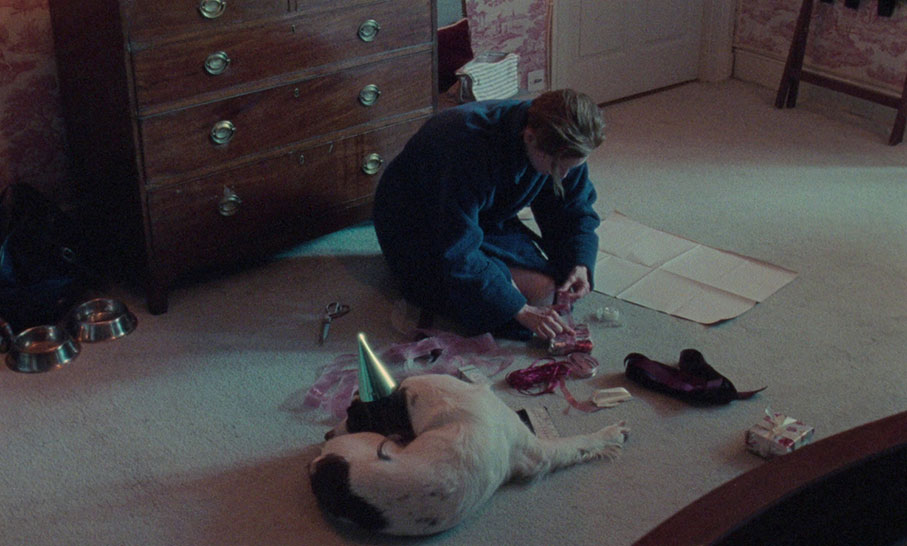
Présages (10:46)
This short film was commissioned by Paris’s Centre Pompidou as part of its collection “Où en êtes-vous?”, which explains why the credits are in French, although this is an English-language piece. It was filmed after The Eternal Daughter (specifically in February 2023, while the feature was made in and copyrighted 2021), but given that this is documentary and that is fiction, however personal it might be, there are quite a few correspondences. Hogg does not appear onscreen, but provides a voiceover as she is in Los Angeles, writing a film which will very likely be set there, but as with Julie in the main feature, it’s in a very inchoate state. Hogg also ruminates on her mother, of whom she dreams and expresses regrets about now that she is no longer alive. (Hogg’s mother did not live to see The Eternal Daughter, passing away during the editing process.)
Joanna Hogg in conversation (76:04)
The conversation is with Jason Wood and it took place at the BFI Southbank on 15 November 2023 as part of a season there, Internal Reflections: The Films of Joanna Hogg, to tie in with the imminent cinema release of The Eternal Daughter. This is a career overview, though Wood doesn’t spend much time on Hogg’s early work directing for television, which included episodes of Casualty and London’s Burning and an Eastenders special, Dot’s Story, which Wood says is the only episode of Eastenders he has ever seen. Hogg says that the impetus for her to make features (she made a short with Tilda Swinton, Caprice, back in 1986, but twenty-one years passed before she made her feature debut) was to work with material that she originated herself and which was personal to herself. Unusually for the disc release of talks and interviews such as this, we do get to see the film extracts included at the event: all six feature films, with just the extract from Unrelated edited out. Questions from the audience are rendered as text captions before Hogg answers. There aren’t any real spoilers for The Eternal Daughter (a screening of which followed, the same evening), but there are for Hogg’s earlier films, if you haven’t seen them. Hogg seems to take a little while to warm up, but she is informative about her work.
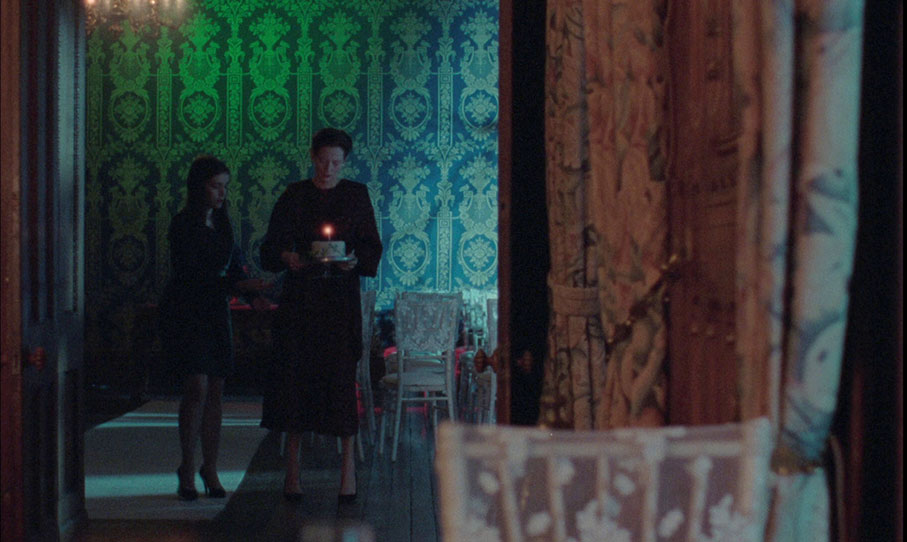
Q & A with Joanna Hogg and Tilda Swinton (34:51)
This took place five days earlier as part of the same BFI season and followed a screening of The Eternal Daughter. The conversation is much more specifically about that film and so be aware that there are significant plot spoilers for that film herein, as the disc menu and a prominent caption at the start of this item warns us. Francine Stock hosts, and there is a clear rapport between Hogg and Swinton, who very obviously go back a long way. Swinton credits Hogg, along with the late Derek Jarman, as the first filmmaker she worked with (in fact, they met at school before they were teenagers), and wonders if she might have had a career in film otherwise. As with the other interview, questions from the audience are rendered as text captions and include some nuts-and-bolts stuff on how the dialogue scenes between the two Swintons were filmed (answer: one character in the morning, a break for hair/makeup changes, then the other character in the afternoon). There is also the revelation that Louis is more of a method actor than his owner.
Trailer (1:51)
This is a trailer which does an adept job of selling this film, not ignoring the fact that the film is a ghost story but not making the audience expect too much of a horror film, and with sufficient critics’ quotes to pull in Hogg’s more arthouse following.
Booklet
The BFI’s booklet, available with the first pressing only, runs to twenty-eight pages. It begins, following a spoiler warning, with Catherine Bray’s “Uncanny Symmetry”. This concentrates on the mother/daughter issues at the heart of the film. It addresses the fact that the film was originally to be made about a decade and a half before it actually was, and maybe the thought of dealing with her own relationship with her mother held Hogg back. Bray talks about Hogg’s creative process, writing not a traditional script but something more of a prose piece, like a novel or short story, and shooting the film in story-sequence order, with the dialogue partly improvised by the cast. Ultimately the essay comes back to this being a story of motherhood and daughterhood, given greater resonance, as it is also in the Souvenir films, by casting those with a family connection, or indeed the same woman.
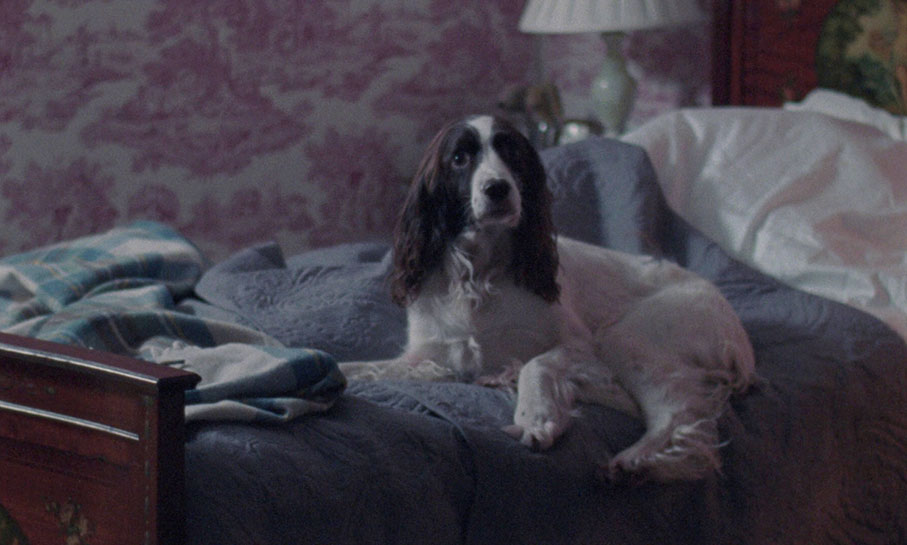
After a four-page credit listing, Hannah Strong contributes “Haunting People, Haunting Places: Joanna Hogg’s Cinema of Experience”. This begins with Hogg’s debut short Caprice, finding that more akin to her later films that the more social-realist first three. Strong then works through Hogg’s filmography, up to and including Présages, tracing the evolution of her style and themes, including her concentration on upper/middle-class characters, rather at odds with much of the rest of the British film industry. Next up is “At the Movies with...Joanna Hogg”, an interview by Roger Luckhurst reprinted from Sight & Sound, on the occasion of the BFI Southbank season mentioned above, which included not just her own films but her selection of films from other directors. She begins by talking about the cinematic ghost stories she took inspiration from (Night of the Demon, The Uninvited, The Haunting) and the literary ones too (Kipling already mentioned, but also M.R. James, Algernon Blackwood, Walter de la Mare and Edith Wharton). However, she also talks about films she included in the BFI season which don’t as obviously inform The Eternal Daughter, from Ulrike Ottinger’s Ticket of No Return, to film noir, and what she calls novelistic cinema, her example being Kenneth Lonergan’s Margaret. The booklet concludes with notes on and credits for the extras on the disc.
With her fourth and fifth feature films, the Souvenir diptych, Joanna Hogg moved to a wider audience than she had reached previously, with Part II winning the Sight & Sound best of year poll in 2021. The Eternal Daughter, using a ghost story to explore a mother/daughter relationship, is likewise clearly personal and engagingly told, with some useful extras on this BFI Blu-ray.
|